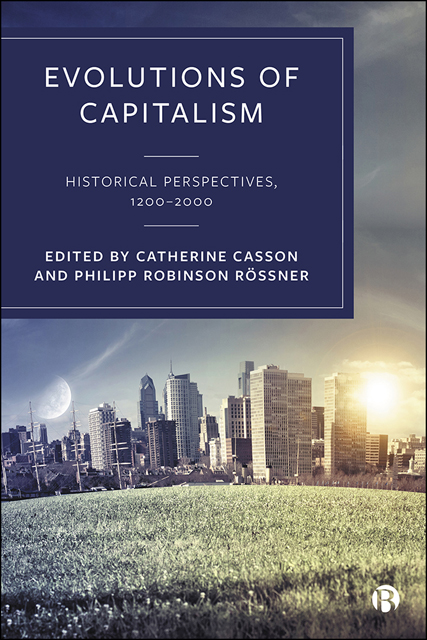Book contents
- Frontmatter
- Contents
- List of Figures and Tables
- Notes on Contributors
- Acknowledgements
- 1 Introduction
- 2 The Market as an Institution: Theory and History
- 3 Regulating Capitalism
- 4 Capitalism and State Ownership Models
- 5 Comparative and Connected Global Capitalism(s)
- 6 Capitalism, Imperialism and the Emergence of an Industrialized Global Economy
- 7 Religion and Capitalism
- 8 Capitalism and the Environment
- 9 Capitalism and Income Inequality
- 10 Conclusion
- Index
8 - Capitalism and the Environment
Published online by Cambridge University Press: 13 October 2022
- Frontmatter
- Contents
- List of Figures and Tables
- Notes on Contributors
- Acknowledgements
- 1 Introduction
- 2 The Market as an Institution: Theory and History
- 3 Regulating Capitalism
- 4 Capitalism and State Ownership Models
- 5 Comparative and Connected Global Capitalism(s)
- 6 Capitalism, Imperialism and the Emergence of an Industrialized Global Economy
- 7 Religion and Capitalism
- 8 Capitalism and the Environment
- 9 Capitalism and Income Inequality
- 10 Conclusion
- Index
Summary
Introduction
The capitalist industry that began with the Industrial Revolution resulted in enormous productivity increases, wealth creation and sustenance as Earth's population soared. Yet the business system as it emerged described the varied impacts on the natural environment as ‘externalities’, and took little responsibility for them. The result was growing ecological damage, which persisted despite warnings by philosophers and scientists. The results were cumulative, and were magnified from the 1980s as some non-Western countries, including China, experienced fast economic growth. Most studies of this phenomenon have focused on policy and regulation, and have looked at this issue from a system-wide perspective on the negative consequences of capitalism. This chapter offers an alternative business history perspective with a more nuanced analysis of the role of business enterprises.
This chapter proceeds chronologically and thematically. The first section reviews the ecological damage between the Industrial Revolution and the 1970s, and the limited attempts by either government or social activists to contain it. The second section reviews the endeavours of small groups of entrepreneurs to create alternative capitalisms before the 1970s that helped rather than damaged the environment. The third section examines the period of corporate environmentalism since the 1980s. These decades saw, for the first time, large corporations that were addressing environmental challenges claiming to become more sustainable. It is less evident that major environmental improvements occurred as a result. The chapter concludes by reflecting why endeavours to create an alternative, more ecological, capitalism have proved challenging.
Capitalism and the problem of environmental Externalities
The evolution of humanity over history has seen the progressive taming of the natural environment and its redeployment to facilitate human development. Settled agriculture and the domestication of animals for use as food and clothing were milestones in this process. The building of cities and the development of methods to trade over distances were further milestones. By the 18th century human intervention had radically changed the natural landscape across the habitable globe. However, even in the most economically advanced regions, the autonomy of the natural world remained strong.
This situation began to change with the Industrial Revolution. Some scientists have identified 1820 as the start of a new Anthropocene Age because modern economic growth resulted in an enormous extension of humanity's ability to control, and damage, the natural environment (Jones, 2017: 4– 5).
- Type
- Chapter
- Information
- Evolutions of CapitalismHistorical Perspectives, 1200-2000, pp. 187 - 211Publisher: Bristol University PressPrint publication year: 2022

